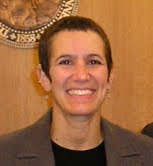While most sign language interpreters come from non-Deaf families, one can develop an intimate understanding of marginalization and oppression by interacting with the Deaf community, recognizing the unique life experiences of Coda interpreters and working to dismantle systems of oppression.
Are sign language interpreters intrinsically connected to the fight for humanity, as suggested by Brandon Arthur in his post, The Goo Inside a Sign Language Interpreter? What is our role working within a marginalized and oppressed community? What is our connection to solidarity? Do we have a broader sense of responsibility to the community that gives us the opportunity and privilege to access and learn language and then to make a living using it?
These are important questions for new and experienced sign language interpreters to consider.
(Note: In this article, the term Codas refers to Children of Deaf Adults who are native American Sign Language users who share language and culture with the Deaf community and their Deaf parents/guardians.)Codas: Distinct Experiences
Dennis Cokely points to the importance of Codas in establishing Sign Language interpreting as a profession in his article, Vanquished Native Voices-A Sign Language Interpreting Crisis?. He describes the importance of Codas not only in the development of our profession, but he identifies the importance of their historical knowledge and distinct lived experience with communication oppression. Many Codas have experienced unique and complex roles, having hearing privilege in a Deaf family, straddling two cultures, and dutifully providing communication access without pay. Perhaps a deeper understanding of privilege contributes to their intrinsic connection to the fight for humanity and communication access.
In my observation, many Codas possess an unequivocal understanding of privilege and power that is not easily recognized by non-Coda interpreters (including myself.) This leaves “the vast majority of us” (Cokely, 2012, para. 4) working to recognize and comprehend the impact of language oppression and the inherent privilege of non-Deaf people.
Institutional Construct: Dehumanization
Let’s consider the institutional construct and social belief system, referred to as the “slant” in Brandon Arthur’s article, Do You Resemble the Sign Language Interpreter in Your Head? He references thefreedictionary.com’s definition of slant as, “To present so as to conform to a particular bias or appeal to a certain audience” (2012, para. 1). He emphasizes the importance of self-awareness and warns that the slant can lead to “impaired self-awareness” (para. 5) not only in our professional narrative when analyzing our production of an interpretation but in other arenas as well.
The slant is a systematic lens formed by our upbringing, culture, social status, etc. It embodies our particular biases related to deafness, race, class, education level, gender, ability, sexual orientation, etcetera that creates “Othering” as described by social theorist Michel Foucault in the study of social science. “Other” is defined by Wikipedia.org as, “The processes by which societies and groups exclude “Others” whom they want to subordinate or who do not fit into their society” (2012, para. 2). Distinguishing the “Other” allows us to establish roles for ourselves, which serves as an important function in society. However, it also “involves the demonization and dehumanization of groups” (“Other,” 2012, para. 2), specifically those unlike our own.
“For the vast majority of us [non-Codas], our initial societally reinforced perceptions of Deaf people are that they are ‘disabled’ and are therefore inferior to those of us who can hear” (Cokely, 2012, para. 4). This institutionalized slant impacts our work and our worldview, and for non-Codas, distinguishes Deaf people as “Other.”
Systematic Marginalization: “Other”
Many Codas are familiar with the impact of being seen as “Other” and are intimately connected to the systematic marginalization and oppression of the Deaf community. Codas are often simultaneously utilizing their hearing status and privilege to provide communication access battling language oppression at young ages. Their intimate understanding of privilege and power, and the realization of their social status from birth, may be the intrinsic connection to marginalization and oppression that some non-Codas are missing. Their unique lived experience of witnessing communication oppression and the impacts of systematic and social dehumanization is a part of the historical knowledge they possess and are able to share with non-Coda interpreters. Perhaps this is what motivated the fight for humanity, inspiring Codas to establish the Registry of Interpreters for the Deaf (RID) in the 1960’s (Cokely, 2012).
Perception: Managing the Slant
My response to Brandon’s question, “Suggestions on how to keep the slant in check?” (2012, para. 18) is to begin by analyzing our own privilege as interpreters. Whether we are White, non-Deaf, able-bodied, straight, employed, male, educated, cisgender, or a combination of these and other identities it can be challenging to recognize our own privilege. Without having experienced the impact of being perceived as “Other” it is hard to intimately connect with the realities faced by those experiencing systematic marginalization and oppression on a daily basis.
Personal Experience: Building Solidarity
My intimate connection to the Deaf community stems from my personal experience of oppression and marginalization, as a Transgender person. I have a visceral reaction to discrimination and injustice because I live within a historical context of inequality and have been personally impacted by marginalization and oppression. As a non-Deaf person, I have never walked into a room in the United States and been denied communication access. I am not personally impacted by daily language oppression. I have been fired from a job and not hired for others because of my gender identity. I have been intimately, professionally, and socially impacted by systematic oppression because of the perceived “condition” or “mental health diagnosis” that has been applied to my identity. I use my life experiences and understanding of how it feels to be seen as “Other” to intimately relate to the discrimination and oppression that Deaf people experience daily. I use my power and privilege, as a White, non-Deaf, educated, economically stable, able-bodied, non-immigrant, English speaking person to interrupt oppression, to build solidarity with other marginalized communities, and to fight for equality.
RID statistics illustrate that 8,414 of the 9,604 members, or 87%, of interpreters reporting to RID identified as Euro-American/White (The RID, 2011). With only 13% of RID members identifying as people of color, how do White interpreters, who do not experience life as “Other,” whether able-bodied, economically stable, well educated, gender normative or a combination of these, intimately connect to systematic marginalization and oppression that the Deaf community experiences?
Connections: Dismantling Systems
One approach is to spend time in the Deaf community. Cokely believes that “to be effective and successful as an interpreter one must absolutely have deep and sustained connections to the Deaf Community” (Cokely, 2012, para. 7). If we cannot intimately connect to the experience of “Others,” how will we intrinsically relate to the importance of the fight for humanity and the necessity of fighting language oppression and the impacts of systematic and social dehumanization? How will we recognize and analyze our own power and privilege, avoiding micro-aggressions against the very community we are passionate to work with? (F. Fleischer, keynote address, June 13, 2012). How do we stand in solidarity, harnessing the passion we have for our interpreting work, to build on our dedication to the Deaf community while contributing to communication access and striving to dismantle systems of oppression?
Experiences: Recognizing and Acknowledging Privilege
One can study the impact and effect of marginalization, oppression and inequality. From my experience, the impact of studying something is drastically different than personally experiencing it, or watching your friends and/or loved ones experience it daily. My privilege and the systematic lens in which it was formed limit my ability to see oppression and marginalization around me. As a White person, I don’t see the clerk not following me when I go to the grocery store in an all-White neighborhood. Therefore, it is challenging to recognize my White privilege. I don’t realize my privilege to stroll around the store uninterrupted until my African American friend joins me. It’s then that I see the clerk following him. I stare in disbelief…“How could this be happening? I love this store,” I tell him. He shrugs and says, “It happens all the time.”
Without experiences like this it is challenging for me to recognize and acknowledge my White privilege. Without personal experiences and conversations, about the impact with my Deaf friends and colleagues, it is challenging to recognize my hearing privilege. As a non-Deaf person it is easy for me to ‘do my day’ forgetting to recognize and appreciate my privileges, to acknowledge them, to analyze the power they bring with no effort but simply because of the systematic and social hierarchy that distinguishes some as “Other.”
Solidarity: Connecting with the Deaf Community
I believe the shared history that many Codas possess comes from a place of solidarity with the Deaf community. Their familiarity with the impact of being seen as “Other” intimately connects them to the impacts of systematic marginalization and oppression. Interpreters have the ability to gain intimate connections to marginalization and oppression through analyzing, understanding and acknowledging our own privilege. We can gain access to the importance of creating a profession that values and prioritizes the recruitment and advancement of marginalized communities in the interpreting field: people of color, the economically disadvantaged, Deaf people, the under educated, persons with disabilities, those who are gender-nonconforming, etc.
Diversity: Enhanced Competence
Increasing access to the interpreting profession and promoting diversity will enhance culturally competent interpreting services for Deaf and non-Deaf consumers. Through conversation and experience with “Others,” we raise our self-awareness and intimate understanding of marginalization and oppression. Using our privilege and power we can dismantle systematic discrimination faced by so many, creating change in solidarity with a community that has given us so much linguistic and financial opportunity.
Special Thanks
I would like to thank Tamar Jackson Nelson for her work to edit this post.
 Tamar is a student in Gallaudet University’s Ph.D. in Interpretation program (pedagogy/research) as well as an adjunct professor for the Department of Interpretation. Tamar enjoys and values presenting and writing about interpreting to promote growth, development, and respect of the interpreting profession. Tamar has worked as a certified community interpreter, mentor, ER on-call manager & interpreter, VRI & VRS interpreter. She enjoys time with her family, state fairs and sunshine.
Tamar is a student in Gallaudet University’s Ph.D. in Interpretation program (pedagogy/research) as well as an adjunct professor for the Department of Interpretation. Tamar enjoys and values presenting and writing about interpreting to promote growth, development, and respect of the interpreting profession. Tamar has worked as a certified community interpreter, mentor, ER on-call manager & interpreter, VRI & VRS interpreter. She enjoys time with her family, state fairs and sunshine.


